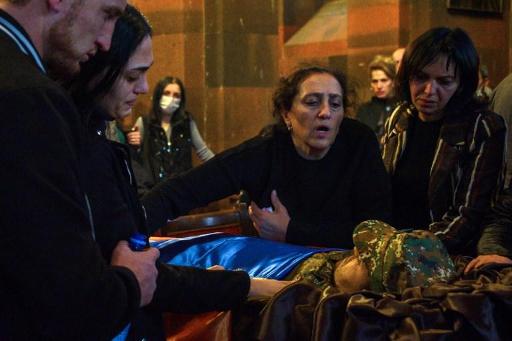The number of people who have died since the resumption of hostilities between Azerbaijan and Armenian separatists in Nagorno-Karabakh “is nearly 5,000,” Russian President Vladimir Putin said.
"According to our information, the number of deaths on both sides is about 2,000, which means the total number is nearly 5,000 dead,” Putin said at a discussion forum shown live on television.
Since 27 September, Azerbaijani forces have recaptured territory over which Baku had lost control since a war that broke out in the 1990s in the wake of the fall of the USSR. Some 30,000 people died in that war, which resulted in the secession of the region, inhabited almost entirely by Armenians.
According to partial results, the fresh fighting has claimed close to 1,000 lives, including about 100 civilians. However, each side also claims to have killed thousands of adversaries.
Russia, the main regional power, has good relations with both camps. Putin said he was in permanent contact with Azerbaijan’s President, Ilham Aliyev, and Armenian Prime Minister Nikol Pachinian.
Putin said on Thursday that the conflict was at its worst.
According to the Russian president, the war originated from a “territorial struggle” and an “ethnic conflict”. He said Moscow understood that such a situation, in which an important chunk of Azerbaijanian territory was lost, could not continue.
On Wednesday, Armenia said there could be no “diplomatic solution” to the conflict, against the background of vain efforts by the international community to negotiate a lasting ceasefire.
Two recent humanitarian truces brokered by Russia both collapsed.
Armenian and Azerbaijani diplomatic chiefs had separate meetings in Washington with their U.S. counterpart, Mike Pompeo on Friday.
EU position
EU’s foreign policy chief Josep Borrell met Armenia’s President Armen Sarkissian in Brussels last week and discussed the situation in and around the Nagorno Karabakh conflict zone. After the meeting, Borrell issued a statement where he urged both sides to return to the negotiationstable "under the auspices of the OSCE Minsk Group Co-Chairs, without preconditions and without delay".
Is the EU considering to step up its effort to deescalate the tension between Armenia and Azerbaijan and become more involved in the attempts to solve the conflict between the two countries, both EU partners in the European Partnership?
Peter Stano, lead spokesperson for Foreign Affairs and Security Policy, replied at a press briefing (22 October) that the EU is continuing its outreach to both sides in the conflict and referred to the above meeting. The EU High Representative has also had repeated telephone calls with the foreign ministers of both countries.
In addition, EU has also a special representative since 2017 for the South Caucasus and the Crisis in Georgia, the Estonian official Toivo Klaar.
“The High Representative is conveying EU’s message that the hostilities must stop and the negotiations must be resumed without any preconditions. The main internationally established platform to solve the Nagorno Karabakh conflict is the co-chaired OSCE Minsk Group. This is the format we are supporting.”
The Brussels Times

